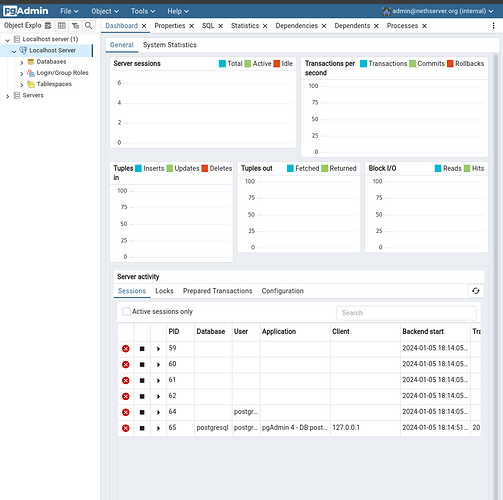noticed that i had not invoked all the services to be started, but shouldnt the one main service that was have started?
this how I do, I suppose that it could be done by another manner
create a pod that require others services ans start before other services
then create other services that are bound to the pod service (it follows the service status: start or stop following what is the service status: start or stop)
BindsTo=roundcubemail.service
After=roundcubemail.service mariadb-app.service
Once you have done this, what is targeting is the pod systeme service and you only need to enabled and start it
This steps is after you have successfully configured all steps before in the configure-module action, one error and you do not launch the action to start the pod hence you do not start the other services
but i think, looking at the module, thats what has been done,
What are the errors/outputs when you trigger the configure-module action
What is the Procedure for Releasing and announcing a new Module for NS8?
Hello world I have a new module to play with ![]()
Happy to read this ![]()
Trying to bring all you missed and some debug command in the read me, once installed you should have a nginx workable container with a mariadb both inside the POD
the UI should be workable for simple use case host, LE and https redirection
I added all I bring when I create a new module
This is a wonderful addition @stephdl this should for a number of project, reduce Module Development by a factor of 2 days. SO now Basically someone could sprung up a module within 1 day, av noted it averagely take s3 days to build a complete Module.
Could you Add to the etc/state-include as well, what’s already setup on your kickstart version, It is usually overlooked, and adding it would help it not be overlooked for many
I think it is included, what I did not add it is the script of dump/restore of database, I wait the review of other developer
Working on postgresql, I must admit that my module is up and configured at 80% just because I cp and paste from kickstart
I noted the file itself is included, the volumes were not…
Exactly My Sentiment, if the Kickstart Module to be used is featre rich and robust enough, it saves Hours of Module Dev Time, and thus Makes it fater to build and Implement Module.
What the module Developer is left figuring out is the module specific items, as well as container specific configs.
@stephdl I am curious about a question i had asked somewhere in the forum before.
With this Kickstart Module that implements MariaDB and Nginx, How could we configure the same, to Server a standard PHP Application that is Non Dockerized.
Allow me to use Installation | YOURLS As an Example, the Github Page is Available here: YOURLS/YOURLS: ![]() The de facto standard self hosted URL shortener in PHP (github.com)
The de facto standard self hosted URL shortener in PHP (github.com)
I believe it should be possible to maybe define/ Wget the Release of the Project to a folder somewhere in the container, unzip, create the necessary config files, (could be injected by the module configs)
And have the Index.php or version of the same loadable by the module.
I hope i made sense in my question, is this something feasible, especially for hostable solutions without docker, or is there another method/model.
yes you need to bind mount the folder where you php application is stored to the container
it is a common scenario/use case
Wait, was that English (kidding) i got lost for abit there, could you kindly Illustrate this if possible.
where in the folder structure should the php application folder be setup,
Where do we do the bind and mount,
a bit tired tonight, did a lot of commit today,
you have tons of example the fact is that you mount a local point/folder to a specific remote point of your container
this is true for many cases not only for php application, you can push files, whole folder etc…
here I moutn two files but it could be whole folders or configuration files
i think i get it now: GitHub - IshtarStar/docker-compose-nginx-phpfpm: Docker Compose Nginx PHP-FPM
Hello, Happy Monday.
its interesting that Many modules on the community modules wiki have been built by you.
Would you be working on GLPI and Dolibarr anytime soon?
Currently i am waiting on your PGSql PR to be published, so i can better understand it to make surrealDB database.
its more similar to PGsql actually, but fundamentally different.
I have deployed and am testing it using coolify, so meaning i can be able to do the same with NS
no ETA for now but this is a good target
HEllo,
I am trying to figure out a way to store and retrive hashed password in a module, based on this
Enabling admin page · dani-garcia/vaultwarden Wiki (github.com)
I have been going through this: python - Argon2 library that hashes passwords without a secret and with a random salt that doesn’t appear parseable - Stack Overflow
as well as this: How To Hash Passwords In Python - GeeksforGeeks
to try and understand how i can adopt the same to NEthserver module in relation to
= data.get and agent.set_env
could someone nudge me in the right direction, my head seems to be spinning in a loop.
this is to prevent this message in the error log
2024-02-06T02:50:13+03:00 [1:vaultwarden2:systemd] Started libcrun container.
2024-02-06T02:50:13+03:00 [1:vaultwarden2:vaultwarden-app] | Starting Vaultwarden |
2024-02-06T02:50:13+03:00 [1:vaultwarden2:vaultwarden-app] [NOTICE] You are using a plain text `ADMIN_TOKEN` which is insecure.

